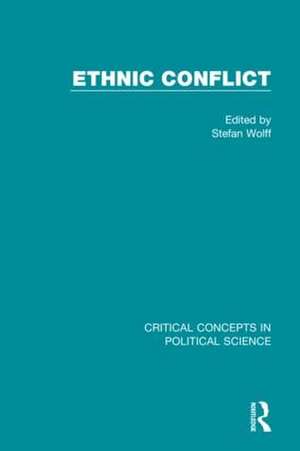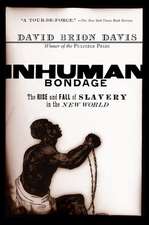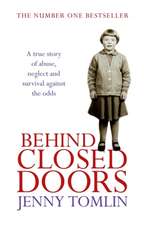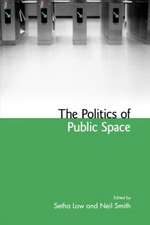Ethnic Conflict: Critical Concepts in Political Science
Editat de Stefan Wolffen Limba Engleză Hardback – 25 oct 2018
While the study of ethnic conflict may have lost some of its early dynamism, as an empirical manifestation of political crisis it has, if anything, gained in importance and, alas, is unlikely to decline in relevance. Now, this new four-volume collection from Routledge answers the growing need for an authoritative reference work to make sense of the different approaches to the study of ethnic conflict, and to offer a comprehensive and representative overview, combining foundational texts with the very best cutting-edge contemporary scholarship.
Ethnic Conflict is fully indexed and includes a comprehensive introduction, newly written by the editor, which places the collected material in its historical and intellectual context. It is an essential reference work and is destined to be valued by scholars and students—as well as policy-makers and practitioners—as a vital one-stop research and pedagogic resource.
| Toate formatele și edițiile | Preț | Express |
|---|---|---|
| Paperback (1) | 174.25 lei 31-38 zile | |
| Oxford University Press – 12 iul 2007 | 174.25 lei 31-38 zile | |
| Hardback (1) | 6186.86 lei 6-8 săpt. | |
| Taylor & Francis – 25 oct 2018 | 6186.86 lei 6-8 săpt. |
Din seria Critical Concepts in Political Science
- 34%
 Preț: 5212.31 lei
Preț: 5212.31 lei - 34%
 Preț: 5929.91 lei
Preț: 5929.91 lei - 34%
 Preț: 5226.18 lei
Preț: 5226.18 lei - 34%
 Preț: 4752.83 lei
Preț: 4752.83 lei - 34%
 Preț: 4540.12 lei
Preț: 4540.12 lei - 34%
 Preț: 4939.47 lei
Preț: 4939.47 lei - 34%
 Preț: 5499.64 lei
Preț: 5499.64 lei - 34%
 Preț: 5208.29 lei
Preț: 5208.29 lei - 34%
 Preț: 3960.26 lei
Preț: 3960.26 lei - 34%
 Preț: 4377.30 lei
Preț: 4377.30 lei - 34%
 Preț: 5633.96 lei
Preț: 5633.96 lei - 34%
 Preț: 6741.21 lei
Preț: 6741.21 lei - 34%
 Preț: 7868.87 lei
Preț: 7868.87 lei - 34%
 Preț: 5348.23 lei
Preț: 5348.23 lei - 34%
 Preț: 7318.32 lei
Preț: 7318.32 lei - 34%
 Preț: 7318.72 lei
Preț: 7318.72 lei - 34%
 Preț: 7295.48 lei
Preț: 7295.48 lei - 34%
 Preț: 7301.60 lei
Preț: 7301.60 lei - 34%
 Preț: 4237.71 lei
Preț: 4237.71 lei - 34%
 Preț: 6743.26 lei
Preț: 6743.26 lei - 34%
 Preț: 6739.59 lei
Preț: 6739.59 lei
Preț: 6186.86 lei
Preț vechi: 9365.61 lei
-34% Nou
Puncte Express: 9280
Preț estimativ în valută:
1183.82€ • 1236.02$ • 979.79£
1183.82€ • 1236.02$ • 979.79£
Carte tipărită la comandă
Livrare economică 04-18 aprilie
Preluare comenzi: 021 569.72.76
Specificații
ISBN-13: 9781138931855
ISBN-10: 1138931853
Pagini: 1677
Ilustrații: 48
Dimensiuni: 156 x 234 x 122 mm
Greutate: 3.26 kg
Ediția:1
Editura: Taylor & Francis
Colecția Routledge
Seria Critical Concepts in Political Science
Locul publicării:Oxford, United Kingdom
ISBN-10: 1138931853
Pagini: 1677
Ilustrații: 48
Dimensiuni: 156 x 234 x 122 mm
Greutate: 3.26 kg
Ediția:1
Editura: Taylor & Francis
Colecția Routledge
Seria Critical Concepts in Political Science
Locul publicării:Oxford, United Kingdom
Public țintă
Postgraduate and UndergraduateCuprins
Ethnic Conflict: Critical Concepts in Political Science
Edited by Stefan Wolff
Introduction
Volume 1
Edited by Stefan Wolff
Introduction
Volume 1
- H. Ben Israel, ‘Nationalism in Historical Perspective’, Journal of International Affairs 45, 2, 1992, 367-397.
- K. Chandra, ‘What is Ethnic Identity and Does It Matter?’, Annual Review of Political Science 9, 2006, 397-424.
- W. Connor, ‘A Nation is a Nation, is a State, is an Ethnic Group, is a…’, Ethnic and Racial Studies 1, 4, 1978, 377-400.
- T. H. Eriksen, ‘Ethnicity Versus Nationalism’, Journal of Peace Research 28, 3, 1991, 263-278.
- J. D. Fearon and D. D. Laitin, ‘Violence and the Social Construction of Ethnic Identity’, International Organization 54, 4, 2003, 845-877.
- J. Fox, ‘Nationalism Versus Civilisations: An Assessment of Alternate Theories on the Future of Ethnic Identity and Conflict’, National Identities 5, 3, 2003, 283-307.
- H. Hannum, ‘The Right of Self-Determination in the Twenty-First Century’, Washington and Lee Law Review 55, 3, 1998, 773-780.
- J. Hutchinson, ‘Myth Against Myth: The Nation as Ethnic Overlay’, Nations and Nationalism 10, 2004, 109-123.
- J. Klabbers, ‘The Right to Be Taken Seriously: Self-Determination in International Law’, Human Rights Quarterly 28, 2006, 186-206.
- R. McCorquodale, ‘Self-Determination: A Human Rights Approach’, International and Comparative Law Quarterly 43, 4, 2008, 857-885.
- M. Moore, ‘Normative Justifications for Liberal Nationalism: Justice, Democracy and National Identity’, Nations and Nationalism 7, 1, 2001, 1-20.
- B. O’Leary, ‘On the Nature of Nationalism: An Appraisal of Ernest Gellner's Writings on Nationalism’, British Journal of Political Science 27, 2, 191-222.
- A. D. Smith, ‘The Myth of the "Modern Nation" and the Myths of Nations’, Ethnic and Racial Studies 11, 1, 1988, 1-26.
- P. L. Van den Berghe, ' Race and Ethnicity: A Sociobiological Perspective’, 1, 4, 1978, 401-411.
- M. Weller, ‘The Self-determination Trap’, Ethnopolitics 4, 1, 2005, 1-26.
- K. Chandra, ‘What is Ethnic Identity and Does It Matter?’, Annual Review of Political Science 9, 2006, 397-424.
Volume 2 - R. W. Ayers and S. Saideman, ‘Is Separatism as Contagious as the Common Cold or as Cancer? Testing International and Domestic Explanations’, Nationalism and Ethnic Politics 6, 3, 2000, 91-113.
- D. Bar-Tal, ‘Sociopsychological Foundations of Intractable Conflicts’, American Behavioral Scientist 50, 11, 2007, 1430-1453.
- M. Basedau, B. Pfeiffer and J. Vüllers, ‘Bad Religion? Religion, Collective Action, and the Onset of Armed Conflict in Developing Countries’, Journal of Conflict Resolution 60, 2, 2016, 226-255.
- H. Buhaug, S. Gates and P. Lujala, ‘Geography, Rebel Capability, and the Duration of Civil Conflict’, Journal of Conflict Resolution 53, 4, 2009, 544-569.
- M. Caprioli, ‘Primed for Violence: The Role of Gender Inequality in Predicting Internal Conflict’, International Studies Quarterly 49, 2, 2005, 161-178.
- D. Carment, ‘The International Dimensions of Ethnic Conflict: Concepts, Indicators, and Theory’, Journal of Peace Research 30, 2, 1993, 137-150.
- L.-E. Cederman, N. B. Weidmann and K. S. Gleditsch, ‘Horizontal Inequalities and Ethnonationalist Civil War: A Global Comparison’, American Political Science Review 105, 3, 2011, 478-495.
- P. Collier, A. Hoeffler and D. Rohner, ‘Beyond Greed and Grievance: Feasibility and Civil War’, Oxford Economic Papers 61, 1, 2008, 1-27.
- T. Ellingsen, ‘Colorful Community or Ethnic Witches' Brew?: Multi-ethnicity and Domestic Conflict During and After the Cold War’, Journal of Conflict Resolution 44, 2, 2000, 228-249.
- J. D. Fearon and D. D. Laitin, ‘Ethnicity, Insurgency, and Civil War’, American Political Science Review 97, 1, 2003, 75-90.
- M. Humphreys, ‘Natural Resources, Conflict, and Conflict Resolution: Uncovering the Mechanisms’, Journal of Conflict Resolution 49, 4, 2005, 508-537.
- J. Ishiyama, ‘Do Ethnic Parties Promote Minority Ethnic Conflict?’, Nationalism and Ethnic Politics 15, 1, 2009, 56-83.
- E. Jenne, ‘A Bargaining Theory of Minority Demands: Explaining the Dog that Did Not Bite in 1990s Yugoslavia’, International Studies Quarterly 48, 4, 2004, 729-754.
- S. J. Kaufman, ‘Symbolic Politics or Rational Choice? Testing Theories of Extreme Ethnic Violence’, International Security 30, 4, 2006, 45-86.
- W. A. Kemp, ‘The Business of Ethnic Conflict’, Security Dialogue 35, 1, 2004, 43-59.
- D. A. Lake and D. Rothchild, ‘Containing Fear: The Origins and Management of Ethnic Conflict’, International Security 21, 2, 1996, 41-75.
- P. Roe, ‘The Intrastate Security Dilemma: Ethnic Conflict as a 'Tragedy'?’, Journal of Peace Research 36, 2, 1999, 183-202.
- M.H. Ross, ‘Psychocultural Interpretations and Dramas: Identity Dynamics in Ethnic Conflict’, Political Psychology 22, 1, 2001, 157-178.
- A. Varshney, ‘Nationalism, Ethnic Conflict, and Rationality’, Perspectives on Politics 10, 1, 2003, 85-99.
Volume 3
- K. M. Bakke and E. Wibbels, ‘Diversity, Disparity, and Civil Conflict in Federal States’, World Politics 59, 1, 2006, 1-50.
- B. Barry, ‘The Consociational Model and Its Dangers’, European Journal of Political Research 3, 4, 1975, 393-413.
- H. M. Binningsbø and S. A. Rustad, ‘Sharing the Wealth: A Pathway to Peace or a Trail to Nowhere?’, Conflict Management and Peace Science 29, 5, 2012, 547-566.
- J. Coakley, ‘The Resolution of Ethnic Conflict: Towards a Typology’, International Political Science Review 13, 4, 1992, 343-358.
- E. Forsberg, ‘Do Ethnic Dominoes Fall? Evaluating Domino Effects of Granting Territorial Concessions to Separatist Groups’, International Studies Quarterly 57, 2, 2013, 329-340.
- D. L. Horowitz, ‘Ethnic Power Sharing: Three Big Problems’, Journal of Democracy 25, 2, 2014, 5-20.
- A. K. Jarstad and D. Nilsson, ‘From Words to Deeds: The Implementation of Power-Sharing Pacts in Peace Accords’, Conflict Management and Peace Science 25, 3, 2008, 206-223.
- C. D. Kaufmann, ‘When All Else Fails: Ethnic Population Transfers and Partitions in the Twentieth Century’, International Security 23, 2, 1998, 120-156.
- A. Lijphart, ‘Consociational Democracy’, World Politics 21, 2, 1969, 207-225.
- I. Lustick, ‘Stability in Divided Societies: Consociationalism v Control’, World Politics 31, 2, 1979, 325-344.
- J. McGarry and B. O’Leary, ‘Consociational Theory, Northern Ireland's Conflict, and its Agreement. Part 1: What Consociationalists Can Learn from Northern Ireland’, Government and Opposition 41, 1, 2006, 43-63.
- J. McGarry and B. O’Leary, ‘What Critics of Consociation Can Learn from Northern Ireland’, Government and Opposition 41, 2, 2006, 249-277.
- B. Reilly, ‘Electoral Systems for Divided Societies’, Journal of Democracy 13, 2, 2002, 156-170.
- N. Sambanis & J. Schulhofer-Wohl, ‘What's in a Line? Is Partition a Solution to Civil War?’, International Security 34, 2, 2009, 82-118.
- S. Wolff, ‘Post-Conflict State Building: The Debate on Institutional Choice’, Third World Quarterly 32, 10, 2011, 1777-1802.
- I. W. Zartman, ‘The Timing of Peace Initiatives: Hurting Stalemates and Ripe Moments’, Global Review of Ethnopolitics 1, 1, 2001, 8-18.
Volume 4 - K. Adeney, ‘The Limitations of Non-consociational Federalism: The Example of Pakistan’, Ethnopolitics 8, 1, 2009, 87-106.
- R. Belloni and S. Deane, ‘From Belfast to Bosnia: Piecemeal Peacemaking and the Role of Institutional Learning’, Civil Wars 7, 3, 2005, 219-243.
- J. Bercovitch and K. DeRouen, ‘Managing Ethnic Civil Wars: Assessing the Determinants of Successful Mediation’, Civil Wars 7, 1, 2005, 98-116.
- F. Bieber and S. Keil, ‘Power-Sharing Revisited: Lessons Learned in the Balkans?’, Review of Central and East European Law 34, 4, 2009, 337-360.
- T. Böhmelt, ‘Why Many Cooks if They Can Spoil the Broth? The Determinants of Multiparty Mediation’, Journal of Peace Research 49, 5, 2012, 701-715.
- T. Capelos and J. Smilovitz, ‘As a Matter of Feeling: Emotions and the Choice of Mediator Tactics in International Mediation’, The Hague Journal of Diplomacy 3, 1, 2008, 63-85.
- N. Caspersen, ‘Good Fences Make Good Neighbours? A Comparison of Conflict-Regulation Strategies in Post-War Bosnia’, Journal of Peace Research 41, 5, 2004, 569-588.
- N. Cheeseman, ‘The Internal Dynamics of Power-Sharing in Africa’, Democratization 18, 2, 2011, 336-365.
- C. Clapham, ‘Rwanda: The Perils of Peacemaking’, Journal of Peace Research 35, 2, 1998, 193-210.
- C. Daase, ‘The Law of the Peacemaker: The Role of Mediators in Peace Negotiations and Lawmaking’, Cambridge Journal of International and Comparative Law 1, 3, 2012, 107-135.
- V. P. Fortna, ‘Does Peacekeeping Keep Peace? International Intervention and the Duration of Peace After Civil War’, International Studies Quarterly 48, 2, 2004, 269-292.
- A. J. Kuperman, ‘Suicide Rebellions and the Moral Hazard of Humanitarian Intervention’, 4, 2, 2006, 149-173.
- A. McCulloch, ‘Does Moderation Pay? Centripetalism in Deeply Divided Societies’, Ethnopolitics 12, 2, 2012, 111-132.
- J. S. Moolakkattu, ‘Peace Facilitation by Small States: Norway in Sri Lanka’, Cooperation and Conflict 40, 4, 2005, 385-402.
- S. M. Saideman, ‘Overlooking the Obvious: Bringing International Politics Back into Ethnic Conflict Management’, International Studies Review 4, 3, 2002, 63-86.
- S. Vandeginste, ‘Power-Sharing, Conflict and Transition in Burundi: Twenty Years of Trial and Error’, Africa Spectrum 44, 3, 2009, 63-86.
Notă biografică
Stefan Wolff is Professor of International Security, University of Birmingham, UK
Descriere
This new four-volume collection is an authoritative reference work that makes sense of the different approaches to the study of ethnic conflict, and offers a comprehensive and representative overview, combining foundational texts with the very best cutting-edge contemporary scholarship.
Recenzii
An important book for our times.
Clear, intelligent, full of relevant case studies. An excellent, accessible overview.
A masterpiece of synthesis, a fine tour of the field... informed, lucid, and accessible.
Very useful... an extensive and insightful review of ethnic conflicts around the world.
Clear, intelligent, full of relevant case studies. An excellent, accessible overview.
A masterpiece of synthesis, a fine tour of the field... informed, lucid, and accessible.
Very useful... an extensive and insightful review of ethnic conflicts around the world.























